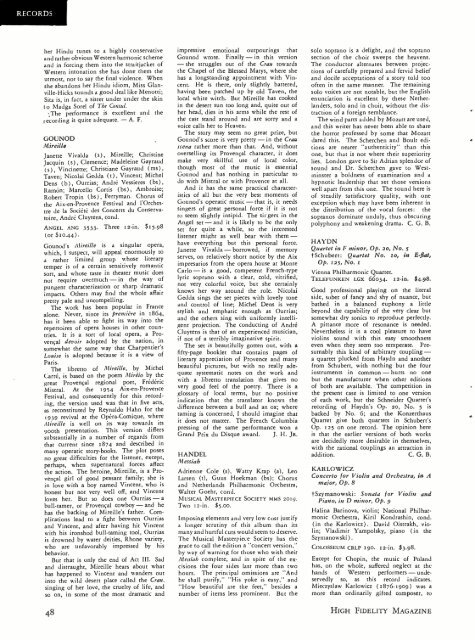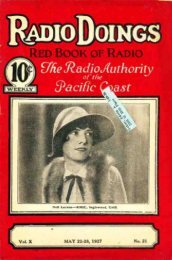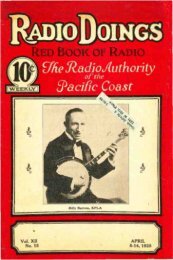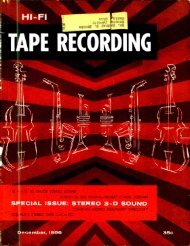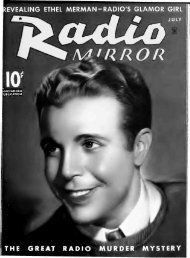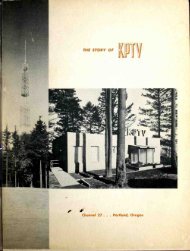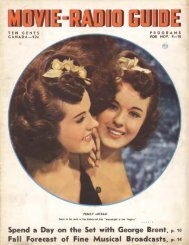Aug - AmericanRadioHistory.Com
Aug - AmericanRadioHistory.Com
Aug - AmericanRadioHistory.Com
Create successful ePaper yourself
Turn your PDF publications into a flip-book with our unique Google optimized e-Paper software.
RECORDS<br />
her Hindu tunes to a highly conservative<br />
and rather obvious Western harmonic scheme<br />
and in forcing them into the straitjacket of<br />
Western intonation she has done them the<br />
utmost, not to say the final violence. When<br />
she abandons her Hindu idiom, Miss Glanville<br />
-Hicks sounds a good deal like Menotti;<br />
Sita is, in fact, a sister under under the skin<br />
to Madga Sorel of The Consul.<br />
The performance is excellent and the<br />
recording is quite adequate. - A. F.<br />
GOUNOD<br />
Mireille<br />
Janette Vivalda (s), Mireille; Christine<br />
Jacquin (s), Clemente; Madeleine Gayraud<br />
(s), Vincinette; Christiane Gayraud (ms),<br />
Taven; Nicolai Gedda (t), Vincent; Michel<br />
Dens (b), Ourrias; André Vessieres (bs),<br />
Ramón; Marcello Cortis (bs), Ambroise;<br />
Robert Tropin (bs), Ferryman. Chorus of<br />
the Aix -en- Provence Festival and l'Orchestre<br />
de la Société des Concerts du Conservatoire,<br />
André Cluytens, cond.<br />
ANGEL ANG 3533. Three 12 -in. $15.98<br />
(or $10.44)<br />
Gounod's Mireille is a singular opera,<br />
which, I suspect, will appeal enormously to<br />
a rather limited group whose literary<br />
temper is of a certain sensitively romantic<br />
sort, and whose taste in theater music does<br />
not require overmuch - in the way of<br />
pungent characterization or sharp dramatic<br />
impacts. Others may find the whole affair<br />
pretty pale and uncompelling.<br />
The work has been popular in France<br />
alone. Never, since its première in 1864,<br />
has it been able to fight its way into the<br />
repertoires of opera houses in other countries.<br />
It is a sort of local opera, a Provençal<br />
devoir adopted by the nation, in<br />
somewhat the same way that Charpentier's<br />
Louise is adopted because it is a view of<br />
Paris.<br />
The libretto of Mireille, by Michel<br />
Carré, is based on the poem Miréio by the<br />
great Provençal regional poet, Frédéric<br />
Mistral. At the 1954 Aix -en- Provence<br />
Festival, and consequently for this recording,<br />
the version used was that in five acts,<br />
as reconstituted by Reynaldo Hahn for the<br />
1939 revival at the Opéra-<strong>Com</strong>ique, where<br />
Mireille is well on its way towards its<br />
9ooth presentation. This version differs<br />
substantially in a number of regards from<br />
that current since 1874 and described in<br />
many operatic story- books. The plot poses<br />
no great difficulties for the listener, except,<br />
perhaps, when supernatural<br />
forces affect<br />
the action. The heroine, Mireille, is a Provençal<br />
girl of good peasant family; she is<br />
in love with a boy named Vincent, who is<br />
honest but not very well off, and Vincent<br />
loves her. But so does one Ourrias -a<br />
bull -tamer, or Provençal cowboy - and he<br />
has the backing of Mireille s father. <strong>Com</strong>plications<br />
lead to a fight between Ourrias<br />
and Vincent, and after having hit Vincent<br />
with his ironshod bull -taming tool, Ourrias<br />
is drowned by water deities, Rhone variety,<br />
who are unfavorably impressed by his<br />
behavior.<br />
But that is only the end of Act III. Sad<br />
and distraught, Mireille hears about what<br />
has happened to Vincent and wanders out<br />
into the wild desert place called the Crau,<br />
singing of her love, the cruelty of life, and<br />
so on, in some of the most dramatic and<br />
48<br />
impressive emotional outpourings that<br />
Gounod wrote. Finally - in this version<br />
-she struggles out of the Crau towards<br />
the Chapel of the Blessed Marys, where she<br />
has a longstanding appointment with Vincent.<br />
He is there, only slightly battered,<br />
having been patched up by old Taven, the<br />
local white witch. But Mireille has cooked<br />
in the desert sun too long and, quite out of<br />
her head, dies in his arms while the rest of<br />
the cast stand around and are sorry and a<br />
voice calls her to Heaven.<br />
The story may seem no great prize, but<br />
Gounod's score is very pretty - in the Crau<br />
scena rather more than that. And, without<br />
overselling its Provençal character, it does<br />
make very skillful use of local color,<br />
though most of the music is essential<br />
Gounod and has nothing in particular to<br />
do with Mistral or with Provence at all.<br />
And it has the same practical characteristics<br />
of all but the very best moments of<br />
Gounod's operatic music - that is, it needs<br />
singers of great personal force if it is not<br />
to seem slightly insipid. The singers in the<br />
Angel set - and it is likely to be the only<br />
set for quite a while, so the interested<br />
listener might as well bear with them -<br />
have everything but this personal force.<br />
Janette Vivalda - borrowed, if memory<br />
serves, on relatively short notice by the Aix<br />
impresarios from the opera house at Monte<br />
Carlo - is a good, competent French -type<br />
lyric soprano with a clear, cold, vitrified,<br />
not very colorful voice, but she certainly<br />
knows her way around the role. Nicolai<br />
Gedda sings the set pieces with lovely tone<br />
and control of line; Michel Dens is very<br />
stylish and emphatic enough as Ourrias;<br />
and the others sing with uniformly intelligent<br />
projection. The conducting of André<br />
Cluytens is that of an experienced musician,<br />
if not of a terribly imaginative spirit.<br />
The set is beautifully gotten out, with a<br />
fifty-page booklet that contains pages of<br />
literary appreciation of Provence and many<br />
beautiful pictures, but with no really adequate<br />
systematic notes on the work and<br />
with a libretto translation that gives no<br />
very good feel of the poetry. There is a<br />
glossary of local terms, but no positive<br />
indication that the translator knows the<br />
difference between a bull and an ox; where<br />
taming is concerned, I should imagine that<br />
it does not matter. The French Columbia<br />
pressing of the same performance won a<br />
Grand Prix du Disque award. J. H. JR.<br />
HANDEL<br />
Messiah<br />
Adrienne Cole (s), Watty Krap (a), Leo<br />
Larsen (t), Guus Hoekman (bs); Chorus<br />
and Netherlands Philharmonic Orchestra,<br />
Walter Goehr, cond.<br />
MUSICAL MASTERPIECE SOCIETY MMS 2019.<br />
Two 12 -in. $5.00.<br />
Imposing elements and very low cost justify<br />
a longer scrutiny of this album than its<br />
many and hurtful cuts would seem to deserve.<br />
The Musical Masterpiece Society has the<br />
grace to call the edition a "concert version,"<br />
by way of warning for those who wish their<br />
Messiah complete, and in spite of the excisions<br />
the four sides last more than two<br />
hours. The principal omissions are "And<br />
he shall purify," "His yoke is easy," and<br />
"How beautiful are the feet," besides a<br />
number of items less prominent. But the<br />
solo soprano is a delight, and the soprano<br />
section of the choir sweeps the heavens.<br />
The conductor alternates between projections<br />
of carefully prepared and fervid belief<br />
and docile acceptations of a story told too<br />
often in the same manner. The remaining<br />
solo voices are not notable, but the English<br />
enunciation is excellent by these Netherlanders,<br />
solo and in choir, without the distraction<br />
of a foreign semblance.<br />
The wind parts added by Mozart are used,<br />
and this writer has never been able to share<br />
the horror professed by some that Mozart<br />
dared this. The Scherchen and Boult editions<br />
are nearer "authenticity" than this<br />
one, but that is not where their superiority<br />
lies. London gave to Sir Adrian splendor of<br />
sound and Dr. Scherchen gave to Westminster<br />
a boldness of examination and a<br />
hypnotic leadership that sec those versions<br />
well apart from this one. The sound here is<br />
of steadily satisfactory quality, with one<br />
exception which may have been inherent in<br />
the distribution of the vocal forces: the<br />
sopranos dominate unduly, thus obscuring<br />
polyphony and weakening drama. C. G. B.<br />
HAYDN<br />
Quartet in F minor, Op. 20, No. s<br />
1-Schubert: Quartet No. ro, in E -flat,<br />
Op. 125, No. r<br />
Vienna Philharmonic Quartet.<br />
TELEFUNKEN LGX 66034. 12 -in. $4.98.<br />
Good professional playing on the literal<br />
side, sober of fancy and shy of nuance, but<br />
bathed in a balanced euphony a little<br />
beyond the capability of the very clear but<br />
somewhat dry sonics to reproduce perfectly.<br />
A pittance more of resonance is needed.<br />
Nevertheless it is a cool pleasure to have<br />
violins sound with this easy smoothness<br />
even when they seem too temperate. Presumably<br />
this kind of arbitrary coupling -<br />
a quartet plucked from Haydn and another<br />
from Schubert, with nothing but the four<br />
instruments in common -hurts no one<br />
but the manufacturer when other editions<br />
of both are available. The competition in<br />
the present case is limited to one version<br />
of each work, but the Schneider Quartet's<br />
recording of Haydn 's Op. 20, No. 5 is<br />
backed by No. 6; and the Konzerthaus<br />
Quartet give both quartets in Schubert s<br />
Op. 125 on one record. The opinion here<br />
is that the earlier versions of both works<br />
are decidedly more desirable in themselves,<br />
with the rational couplings an attraction in<br />
addition. C. G. B.<br />
KARLOWICZ<br />
Concerto for Violin and Orchestra, in A<br />
major, Op. 8<br />
tSzymanowski: Sonata for Violin and<br />
Piano, in D minor, Op. 9<br />
Halina Barinova, violin; National Philharmonic<br />
Orchestra, Kiril Kondrashin, cond.<br />
(in the Karlowicz). David Oistrakh, violin;<br />
Vladimir Yampolsky, piano (in the<br />
Szymanowski ) .<br />
COLOSSEUM CRLP 190. r2 -in. $3.98.<br />
Except for Chopin, the music of Poland<br />
has, on the whole, suffered neglect at the<br />
hands of Western performers - undeservedly<br />
so, as this record indicates.<br />
Mieczyslaw Karlowicz (1876 -1909) was a<br />
more than ordinarily gifted composer, to<br />
HIGH FIDELITY MAGAZINE


